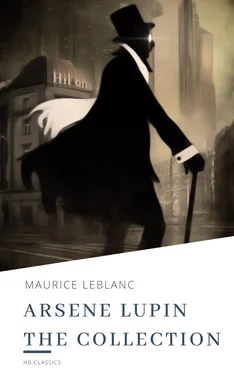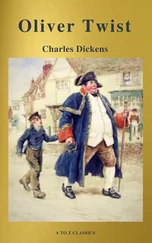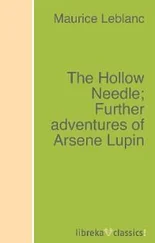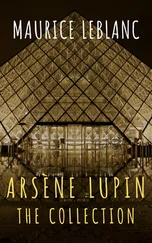"Prove the contrary."
After uttering this defiance, Beautrelet was silent for a time and then, slowly, with his eyes closed, as though trying to fix and sum up his thoughts, he said:
"Possessing the secret, the captain of the guards begins by revealing it bit by bit in the journal found by his descendant. Then comes silence. The answer to the riddle is withheld. Why? Because the temptation to make use of the secret creeps over him little by little and he gives way to it. A proof? His murder. A further proof? The magnificent jewel found upon him, which he must undoubtedly have taken from some royal treasure the hiding-place of which, unknown to all, would just constitute the mystery of the Hollow Needle. Lupin conveyed as much to me; Lupin was not lying.
"Then what conclusion do you draw, Beautrelet?"
"I draw this conclusion, my friends, that it be a good thing to advertise this story as much as possible, so that people may know, through all the papers, that we are looking for a book entitled The Treatise of the Needle. It may be fished out from the back shelves of some provincial library."
The paragraph was drawn up forthwith; and Beautrelet set to work at once, without even waiting for it to produce a result. A first scent suggested itself: the murder was committed near Gaillon. He went there that same day. Certainly, he did not hope to reconstruct a crime perpetrated two hundred years ago. But, all the same, there are crimes that leave traces in the memories, in the traditions of a countryside. They are recorded in the local chronicles. One day, some provincial archaeologist, some lover of old legends, some student of the minor incidents of the life of the past makes them the subject of an article in a newspaper or of a communication to the academy of his departmental town.
Beautreiet saw three or four of these archaeologists. With one of them in particular, an old notary, he examined the prison records, the ledgers of the old bailiwicks and the parish registers. There was no entry referring to the murder of a captain of the guards in the seventeenth century.
He refused to be discouraged and continued his search in Paris, where the magistrate's examination might have taken place. His efforts came to nothing.
But the thought of another track sent him off in a fresh direction. Was there no chance of finding out the name of that captain whose descendant served in the armies of the Republic and was quartered in the Temple during the imprisonment of the Royal family? By dint of patient working, he ended by making out a list in which two names at least presented an almost complete resemblance: M. de Larbeyrie, under Louis XIV., and Citizen Larbrie, under the Terror.
This already was an important point. He stated it with precision in a note which he sent to the papers, asking for any information concerning this Larbeyrie or his descendants.
It was M. Massiban, the Massiban of the pamphlet, the member of the Institute, who replied to him:
SIR:
Allow me to call your attention to the following passage of Voltaire, which I came upon in his manuscript of Le Siecle de Louis XIV.
Chapther XXV: Particularites et anecdotes du regne
"I have heard it said by the late M. de Caumartin, intendant of finance, who was a friend of Chamillard the minister, that the King one day left hurriedly in his carriage at the news that M. de Larbeyrie had been murdered and robbed of some magnificent jewels. He seemed greatly excited and repeated:
"'All is lost—all is lost—'
"In the following year, the son of this Larbeyrie and his daughter, who had married the Marquis de Velines, were banished to their estates in Provence and Brittany. We cannot doubt that there is something peculiar in this."
I, in my turn, will add that we can doubt it all the less inasmuch as M. de Chamillard, according to Voltaire, WAS THE LAST MINISTER WHO POSSESSED THE STRANGE SECRET OF THE IRON MASK.
You will see for yourself, Sir, the profit that can be derived from this passage and the evident link established between the two adventures. As for myself, I will not venture to imagine any very exact surmise as regards the conduct, the suspicions, and the apprehensions of Louis XIV. in these circumstances; but, on the other hand, seeing that M. de Larbeyrie left a son, who was probably the grandfather of Larbrie the citizen-officer, and also a daughter, is it not permissible to suppose that a part of the papers left by Larbeyrie came to the daughter and that among these papers was the famous copy which the captain of the guards saved from the flames?
I have consulted the Country-house Year-book. There is a Baron de Velines living not far from Rennes. Could he be a descendant of the marquis? At any rate, I wrote to him yesterday, on chance, to ask if he had not in his possession a little old book bearing on its title- page the word aiguille; and I am awaiting his reply.
It would give me the greatest pleasure to talk of all these matters with you. If you can spare the time, come and see me.
I am, Sir, etc., etc.
P.S.—Of course, I shall not communicate these little discoveries to the press. Now that you are near the goal, discretion is essential.
Beautrelet absolutely agreed. He even went further: to two journalists who were worrying him that morning he gave the most fanciful particulars as to his plans and his state of mind.
In the afternoon, he hurried round to see Massiban, who lived at 17, Quai Voltaire. To his great surprise, he was told that M. Massiban had gone out of town unexpectedly, leaving a note for him in case he should call. Isidore opened it and read:
I have received a telegram which gives me some hope. So I am leaving town and shall sleep at Rennes. You might take the evening train and, without stopping at Rennes, go on to the little station of Velines. We would meet at the castle, which is two miles and a half from the station.
The programme appealed to Beautrelet, and especially the idea that he would reach the castle at almost the same time as Massiban, for he feared some blunder on the part of that inexperienced man. He went back to his friend and spent the rest of the day with him. In the evening, he took the Brittany express and got out at Velines as six o'clock in the morning.
He did the two and a half miles, between bushy woods, on foot. He could see the castle, perched on a height, from a distance: it was a hybrid edifice, a mixture of the Renascence and Louis Philippe styles, but it bore a stately air, nevertheless, with its four turrets and its ivy-mantled draw-bridge.
Isidore felt his heart beat as he approached. Was he really nearing the end of his race? Did the castle contain the key to the mystery?
He was not without fear. It all seemed too good to be true; and he asked himself if he was not once more acting in obedience to some infernal plan contrived by Lupin, if Massiban was not for instance, a tool in the hands of his enemy. He burst out laughing:
"Tut, tut, I'm becoming absurd! One would really think that Lupin was an infallible person who foresees everything, a sort of divine omnipotence against whom nothing can prevail! Dash it all, Lupin makes his mistakes; Lupin, too, is at the mercy of circumstances; Lupin has an occasional slip! And it is just because of his slip in losing the document that I am beginning to have the advantage of him. Everything starts from that. And his efforts, when all is said, serve only to repair the first blunder."
And blithely, full of confidence, Beautrelet rang the bell.
"Yes, sir?" said the servant who opened the door.
"Can I see the Baron de Velines?"
And he gave the man his card.
"Monsieur le baron is not up yet, but, if monsieur will wait—"
"Has not some one else been asking for him, a gentleman with a white beard and a slight stoop?" asked Beautrelet, who knew Massiban's appearance from the photographs in the newspapers.
Читать дальше












